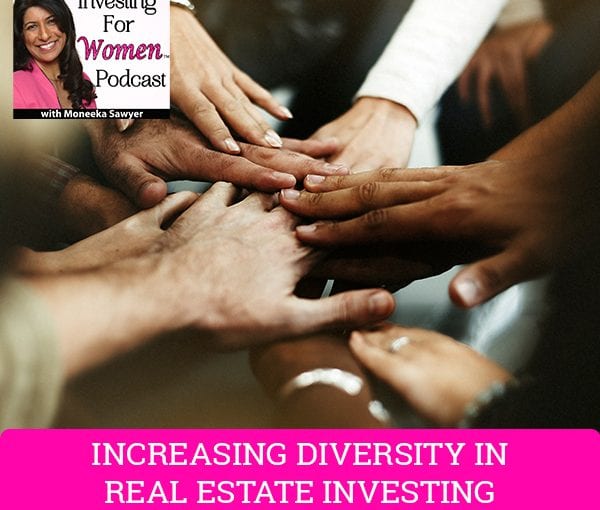Setting Up Your 2025 for Success!
Moneeka Sawyer is often described as one of the most blissful people you will ever meet. She has been investing in Real Estate for over 20 years, so has been through all the different cycles of the market. Still, she has turned $10,000 into over $5,000,000, working only 5-10 hours per MONTH with very little stress.
While building her multi-million dollar business, she has traveled to over 55 countries, dances every single day, supports causes that are important to her, and spends lots of time with her husband of over 20 years.
She is the international best-selling author of the multiple award-winning books “Choose Bliss: The Power and Practice of Joy and Contentment” and “Real Estate Investing for Women: Expert Conversations to Increase Wealth and Happiness the Blissful Way.”
Moneeka has been featured on stages including Carnegie Hall and Nasdaq, radio, podcasts such as Achieve Your Goals with Hal Elrod, and TV stations including ABC, CBS, FOX, and the CW, impacting over 150 million people.
Scaling A Multifamily Portfolio With Liz Faircloth – Real Estate For Women
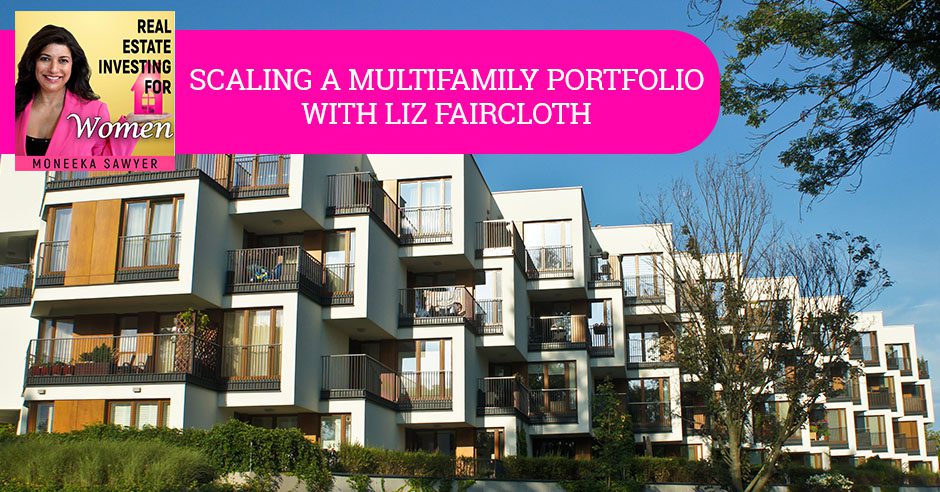
Investing in real estate is a learning process. From buying your first property to scaling a multifamily portfolio, investors learn many lessons in between. In this episode, Moneeka Sawyer sits down for a discussion with Liz Faircloth, a social worker, entrepreneur, co-founder of The DeRosa Group, and co-founder of The Real Estate Investher community. Liz shares how she got into real estate investing and talks about what she learned about investing in many types of real estate. She shares why they settled on multifamily and what you need to do to become successful in the real estate game. Tune in to learn more on what it takes for real estate investing success.
—
Watch the episode here
Listen to the podcast here
Scaling A Multifamily Portfolio With Liz Faircloth – Real Estate For Women
Real Estate Investing For Women
I am so excited to welcome to the show, Liz Faircloth. Liz Faircloth co-founded the DeRosa Group in 2005 with her husband, Matt. The DeRosa Group based in Trenton, New Jersey is an owner of commercial and residential property with a mission to transform lives through real estate. DeRosa has vast experience in bringing properties to their highest and best value, which includes repositioning single-family homes, multifamily apartment buildings, mixed-use retail and office space. The company controls close to 1,000 units of residential and commercial assets throughout the East Coast.
Liz is the Co-founder of The Real Estate InvestHER Community, a platform to empower women to live a financially free and balanced life through over 25 Meetups across the US and Canada, and an online community and membership that offers accountability and mentorship for women to take their businesses to the next level. She is the co-host of The Real Estate Investher Show, which I will be on too. They published their first book, The Only Woman in the Room: Knowledge and Inspiration from 20 Successful Real Estate Women Investors.
Liz has been interviewed for many articles and top-rated podcasts, including mine. Including being a two-time guest on the top-rated BiggerPockets Podcast and the Best Ever Show. On the personal side, Liz is an avid runner, has completed several triathlons and marathons, has two adorable children and is a New York Mets fan. Hello there, Liz.
Thank you so much for having me.
You and Andresa do so much cool stuff with the InvestHER Community. I love what you’re doing together but I haven’t really gotten to chat with you about what you’re doing. Liz, why don’t you give us a high-level version of your story of how you got interested in real estate and what your path has been?
It wasn’t a linear path. At the time, my now husband and I had started dating. Before we started dating, I was in graduate school for Social Work. I got my Master’s in Social Work. I want to open my own practice and help people. That’s been always my passion. During that time, my brother-in-law who was the only entrepreneur I ever met, grew up in a great family but middle-class family. My dad was a teacher. I was never introduced to entrepreneurs or investors, that just wasn’t in my sphere of any context growing up. Hard work ethic was there, but certainly the business piece of it, I was not familiar with or didn’t have a lot of exposure to.
Until I met my brother-in-law, who was an entrepreneur, started a business and handed me Rich Dad, Poor Dad. I’m 23 at the time and he’s like, “You have to read this.” I’m like, “All right.” I like personal growth books. I started in college reading different books and I always enjoyed them. I like learning and growing. Long story short, I read that it. My eyes were opened to this idea of passive income. I honestly never heard of that before. It’s like, “I can have money working for me, not me working for money.” It was a whole new, open-my-eye concept, which I know a lot of people have said.
What got us involved was
I then started dating my now husband. We lived about two hours from each other. Every weekend, we go to all the REIA meetings and start learning. We’re in our twenties, didn’t know anything. We didn’t have any money to invest, but we said, “Let’s give this a go.” We started taking courses. This is before Facebook Marketplace. This is literally open the newspaper, go to ads and call tired landlords. That was the million-dollar tip we got at one of the events. That’s what we did every weekend, literally knocking on doors, right outside of Philadelphia, where my husband lived and when I visited him.
One day, we got someone to say, “That’s interesting. Let me think about that.” Then we called them back and struck up a deal. A year into us taking courses and door knocking and cold calling and bootstrap whatever we could do, we struck up a deal and bought our first property. It was a duplex about $150,000. We learned everything on that property. We’d go with the people. When you buy a property, the tenants that are there may not be your tenants ongoing because there’re a new sheriff in town. The whole multifamily opened our eyes. There are only multis in this neighborhood. It wasn’t like we chose a duplex. It just so happened because it was like older homes right outside of Philadelphia. There were only duplexes and small multis. We got our start there and then we moved to New Jersey and then started our business focused on New Jersey and buying properties there. We sold that property and did 1031 into a four-unit, then that started our trajectory in New Jersey.
Over the fifteen years I’ve been doing this, we had lots of twists and turns. I wish we just focused on multi but we didn’t. We got involved a lot of different things early on. People would get distracted as we usually do. We were probably a little naïve and young. We flipped houses, we got into tax liens, we bought a commercial building, we bought raw land. Every random thing you could possibly think of, we probably have done it, until we doubled down on multifamily. Our business now is focused on multifamily. We went from a 2 duplex to a 10-unit. We grew very steadily. We didn’t go from a 2 to a 200-unit. We did, but over time.
Now, we focus on larger multis and we’re starting a fund where we’re actually investing with other operators. We’re diversifying a little bit outside of multi but more like from a funding perspective. I’m involved in that, not day-to-day, but more from like a strategic level and helping build our team out. It’s exciting to be able to invest in different sectors of real estate, not just multifamily. We do love multifamily. We have a letter of intent on a property in the Southeast, which is where we are focused on now.
Tell me a little bit more about this fund. Let’s dive a little deeper in that.
You want to make sure you're mitigating risk for yourself, but most importantly, your industries. Share on XIt’s something that we’ve talked about over the year and then COVID obviously happened. COVID happened, the pandemic and everything. You’re in California, I’m in Pennsylvania. We’re in the thick of shut downs. I know things are opening up, which is wonderful and people are getting along. All the conversations we had were like, “How’s this going to affect our buildings?” I have to say with our multifamily, any loan that came out, we took advantage of. We didn’t know how it was going to affect. We didn’t know who’s going to be able to pay. We didn’t know what’s going to happen with tenants and everything like that. Our buildings, knock on wood, the ones that were doing well are stable and have thrived during COVID.
We had a building in North Carolina that was 40% occupied. It was literally a turnaround building. It was 200 units. We got it up to 90% during COVID. Some of these buildings thrived. Other buildings that were having some issues prior to COVID continued to have some issues. While that was a stable sector for us, we’re all in on that sector. My husband and I talked a lot about as we grow our businesses, what do we want to do? We want to diversify and the importance of that, and what does that look like? The fund is an opportunity. We’ve always focused on raising money and then putting it specifically into a building, into a project.
With regards to the fund, we talk to people all the time. People are like, “This sounds like a great opportunity to pass an investor.” Then you’re like, “I don’t have a building. I don’t have anything under contract right now.” We refer them. We know a lot of people we like and respect in the business. We have no problem with that. There are a lot of good syndicators out there. We wanted to have another flavor of ice cream, if you will.
The fund will obviously be an ongoing rolling fund, and it will give investors what we’re going to actually invest in are all things that we know, and that we’ve vetted it. We’re not going to start investing in a business that we have no idea because that’s a whole other level. It’s like mitigating risk. We want to mitigate your risks. You want to make sure you’re mitigating risk for yourself, but most importantly, your investors. Hard money loans, that will be one. We’re going to start to work with maybe the hard money operators that we like and respect that we know do good business. We’re not the hard money loan lenders. They are, and we’re going to do that. Multifamily will be a piece of it. If we have a project that comes up, we’re going to almost invest in our own projects and that will be a piece of it.
Those are the two main pieces. I want to say even like self-storage and those operators, that might be another sector. They’re related to investing in real estate on some level, but it will be in a way that we are not the sole operators of everything. As we evolve, you don’t want to do everything yourself. You want to be able to do what do you do well. Once you figure that out, you have to focus on that. That’s what that looks like. We’re building out a team and that’s been in the making for some time, but that’s the goal.
I’m fascinated by that idea because I feel like, for me too, there’s something that I do really well. I do executive homes in the Silicon Valley. I’ve got my entire systems. It’s all built out. It runs itself. I don’t worry too much about it. I was telling you before that I’m taking all of my May off for my birth month because that’s where my birthday is. We’re traveling to Hawaii and I’m going to a spa in Palm Springs with my sister. We had our vaccinations, we’re all taken care of, we’re doing our tests, everything’s good. We’ve decided that it’s time to celebrate. That lifestyle is fantastic. I’m not particularly interested in working significantly more. I do get boards, we have construction projects, we have some other stuff going on so that my entrepreneurial mind doesn’t slow down or get bored.

Multifamily Portfolio: What commercial brokers care about is if you’ve closed deals, they do not want to work with people who are going to get to the finish line and not be able to pull the money together because they want their commission.
What is happening is I found several different syndicators doing different things. I’ve invested in storage, multifamily and a variety of different things. I often wondered because each time that I invest, and I don’t know how this is going to work for you guys, but every single time I invest, it’s a minimum of $100,000. That’s great for us because we have that money, we’re looking to retire, we’re moving that way, but not everybody who’s reading this has access to $100,000 for this and $100,000 for that. They want to be able to diversify without spending that much money. What does that fund look like for you? Is there going to be a minimum investment? Have you worked that out?
I think we’re still working that out. One of the key team members that we knew that we needed, it’s not how but who. You can start to build out different businesses, you can’t know everything. I don’t want to know everything quite honestly, that just hurts my brain a little bit to know everything. We’re women, we want to know everything. Anyway, one of the people that is a key principle in this endeavor is a fund manager from Wall Street who has run funds. As we’ve talked to him, I think the minimums are going to, I’m not sure exactly. I will say though, one organization we’ve started working with is called Republic. Basically, what they do is they in essence have a similar type of approach, in that people can invest $10,000, even down to $1,000. Don’t quote me on that, but I’m not familiar.
What’s fascinating though for our last indication was a 336-unit apartment building. Our minimum was $50,000 on that project. Not everyone has that but they want to invest in real estate. We found this company and what they’re doing is they’re the investor in that project, but they’re the ones going out to the accredited investors to then say okay to all pooling all this money together. Then they are the investor in that project with us. They’re all pooled in this together in this company called Republic, then Republic is ultimately the investor, if that makes sense.
It was cool because that was the first time we had ever done that. If you think about it, we have a 336-unit apartment complex. We had close to 80 investors. It’s a lot of people, even with a minimum of $50,000. We had some people who put $500,000 and some people put $100,000, any amount. There’s a lot of money. I’m the cheapest person, I’d be putting $1,000 at anything. That’s me. I know, I get it. We were really pleased to see that. It’s a neat approach. I think that’s the future to be honest because I love that concept and I was really intrigued by it. As we do other deals, we’re going to be working with them. I’m not sure the relationship exactly how that’s going to play out in the fund, but that was just a neat example for our last indication that gave everyone the opportunity.
Are they more of crowdfunders or are they syndicators? Do you have any idea on their structure?
I’m not too sure which level they are. I just heard about it conceptually and was intrigued. I know that they’ve been around and they’re not just at the start of their company. There are a lot of different pieces around it to ensure how you do it. Some funds are accredited, not accredited, and all that plays as well. There’s a lot of legal stuff, a lot of money to see attorneys and all that stuff. Because it’s a project, you can’t solicit. It’s illegal to do that. There are other projects from friends and family. I know that with this particular project it’s because we only accepted accredited. It’s a neat approach and I’m happy to get more info.
Don't get distracted, focus on a niche and go all in on one thing. Share on XLet’s put our heads together. I’d love to hear a little bit more about that. I’m always looking for ways when I get phone calls from my ladies, when they say, “I’ve only got this much.” What can we do with that to benefit them in the biggest way? That would be amazing. Another topic that I’m getting a lot from my ladies is this idea of out-of-state investing. Especially here in California, there are a lot of markets where people feel like, “I can’t really invest in my backyard,” and they’re scared to go out-of-state. I know that you do a lot of multifamily out-of-state, so let’s talk a little bit about that, your perspective and how to look for projects and stuff like that.
For our first seven years, we invested locally. We had a rule where we don’t invest more than 30 minutes away. We did a team. We did a leasing agent. We had our bookkeeper who did all the accounting. We have a tenant relations person. We had a maintenance person. We had four people on our staff besides me and my husband, helping us manage our local properties. We bought a property in Philadelphia which was an eighteen-unit and that was 35 minutes, so we went, “We could still do it.” Then the market shifted. I’m in the Northeast, and New Jersey is not the most favorable state on taxes in this country. Even in Philadelphia, the projects that we were looking at were getting outbid, it was getting more expensive. We raise money, we work with investors. The returns are important to ensure that we’re going to get into the right projects. We’re not just parking millions of dollars from a relative.
We’re constantly looking at how we’re going to get into the right area for our investing goals and our investors. A broker had brought the same broker and that’s the first thing I’d say as a good tip is start building relationships with commercial brokers. Sometimes it’s tough, especially now. Think about a hot market, everyone’s calling commercial brokers saying, “I invest in multifamily, do you have anything for me?” “Yeah, you and 90 million other people.” You’ve got to differentiate, keep that in mind too.
We had closed that eighteen-unit with the same broker who called us about a property in Lancaster, Pennsylvania, which is about an hour and a half from where we were living at the time. He said, “Are you interested?” We’re like, “Cool, like an hour and a half. We’re not going to send our leasing agent there. We’re not sending our maintenance person there. We need to look into property management companies.”
After vetting the deal, and that’s a great story that ended up itself. The first domino always is a good property management company. You’re going to need that. Some people successfully invest in properties and they self-manage the properties. I’ve heard of it. I know a lot of women who do it successfully. We knew at a 49-unit, that wasn’t going to be our best strategy. We knew it was going to be important to have a good and local property management company. Why I say that’s a great person to have on your team? Say you’re sourcing an area in Alabama or wherever you’re sourcing deals. Before even looking for a property, start getting to know the property management companies there because that’s going to follow. If you cannot find a property management company in a geographical area, that might be a sign for a lot of reasons that something is off.
Even with Airbnb, which is very hot, vacation rentals and luxury vacation rentals, whatever the people are interested in. If it’s a hot area, there are people managing in that hot area, and that’s a great source and a great team member to start to talk to. Number one, they know the area. What streets are good? Which streets aren’t good? What areas are up and coming? What areas are too hot and expensive? Because we know that’s the case. We’ll wait in an exuberant way now. Everywhere is like, “Hold on, what do you want?”

Multifamily Portfolio: The idea of the diversity of jobs is even more important than job growth, they’re both important.
I called up my way to Target. You’re a real estate investor, you never turn it off. I saw a sign that said ‘For Sale’ and it had a handwritten phone number. I’m like, “That’s a good sign.” Great area, Bucks County, where I live and I’m like, “That’s an interesting area.” I texted the person, guy, gal, I don’t know who it is. I said, “How much is the lot and what’s the size? Is it with sewer?” all the things you ask. We’ve done a bit of new construction a lot of times but we could probably pull it off. “$250,000.” I don’t even know if you’d get $500,000 for the property. That’s just for the lot. People are nutty with their prices right now.
Going back to out-of-state, I think property management companies are helpful to have on your team as an initial team member. What commercial brokers care about is if you’ve closed deals. They do not want to work with people who are going to get to the finish line and not be able to pull the money together because they want their commission. That’s what they care about. Beyond everything else you want to talk about with them, they care about if you’ve closed with them or with anyone. If you or someone on your core team has closed deals that you’re looking for. If you’re looking at a 100-unit, you better have someone that you’re bringing to the table that’s like, “This is the kind of team we have, the kind of team we’ve done and this is what we’ve closed.” That is what they’re thinking right now when you call them.
This broker brought us this project and we started to talk to property management companies in the area and vet the area. What really helped, and I always say this, if you have somebody in your family or in your network who lives in the area is really helpful. They don’t need to have a degree in real estate. They don’t have to have ten years in investing. If you have some boots on the ground and feet on the street, people that aren’t just property management because remember, property management company is a vendor.
We always like to offer our property manager company’s potential ownership in the building. Every time we buy a building, we say, “We’re syndicating this, would you like to own part of it as well?” It’s not the best sign if they’re like, “No.” Even if they put $25,000, maybe they think that’s like chump change. Most of all the property management companies we’ve worked with have invested in our deals and that’s a good sign as skin in the game, so to speak.
I would say the second thing is to start to look at, “Is this an up-and-coming area? Do I know anyone in my network that can help me? Is there a reason to go there? Do I want to go there?” If you’re going to invest in an area, those are questions to ask, “If I have to now get on a plane, is that on the way to my aunt or my parents? Is this an area that my kid can go to college for the next four years?” Make it make sense. Versus an area that literally you know no one. That can work but if you can blend a few things in there and it is an up-and-coming area, you’re going to want somebody that’s 10, 15 minutes from the property, whether it’s a realtor, whether you have to pay them hourly. If you can’t get there, someone needs to get there because fires happen, things happen.
We have a cousin in this area, Lancaster. When we’re looking at it, we’re like, “What do you think?” He’s an investor, which was even better. He was able to be our boots on the ground. He’s part of our general partnership. We had a fire there years ago. We want to make sure everyone’s okay. We also want to see what’s going on. In an hour and a half, the fire is probably going to throw a little more damage than ten minutes.
Don't give up. Your mistakes are going to propel you forward and you're going to learn and grow from them. Share on XA couple of things that I want to highlight is that people think that you hear about an amazing market and you should go invest in there. I remember in the mid-2000s, everybody was in Henderson, Nevada, right outside of Las Vegas. I had close friends who all invested. There was also Florida, there was also Chicago. Those were some big hubs where they were really marketing to investors from out of state, especially California. Californians had a bunch of equity and it wasn’t working for us. Everybody could get loans by just stating things.
There were these pockets that were trending. People were making money hand over fist. For me, I always play the longer trend. I don’t play the short-term trends. I would admit, I would probably be a lot richer if I got that right more often, but there are many people that get that wrong. Part of it is that they didn’t do some of the things that you talked about. It wasn’t a place that I would ever want to visit. It wasn’t a place on the way to anything. Las Vegas, it is. Chicago, it is. Florida, it is. A lot of people didn’t have that mentality of, “Would I want to go there? Would I vacation there? Would I want to live there? Would I want my kids to go to college there? Is there any reason for me to go there?” Even in Henderson, it’s not like people were like, “I’d like to have something in Henderson because I like to go to Las Vegas.” No, it was, “I’m investing in Henderson because everybody else is investing in Henderson.”
I love how you talk about this, especially in your first few deals, I think this is hugely important is as you’re getting to know what this is like. The very first time you step out of state, you don’t want to be in a market that you completely don’t understand, that you just get a bunch of numbers from someone that’s a vendor. They’re interested in selling these properties. They’re not going to lie to you, but they’re definitely going to paint a pretty picture.
We had a friend that moved to Henderson and we went to visit them one time when we went on a trip to Las Vegas. He was like, “There are all these crazy investors coming in here.” All around town, people were like, “This bubble is going to blow,” because there weren’t as many people in the restaurants anymore. There were things that were closing down. We’re like, “How is it possible that all this expansion is happening but the actual economy is shrinking?” There’s no way to have known that if we hadn’t had this conversation with our friends that had just moved there. There’s all this hype about Henderson, but they just closed down the local Whole Foods or whatever market it was.
I love what you talk about is we don’t have to have boots on the ground all the time, every time. Eventually you do develop a skill in getting to know markets or you focus on certain markets. Especially in those first few deals that you’re going out, that is all such good advice, Liz. Make sure that it’s someplace you would want to go. It’s like basic, intuitive, common sense stuff that we don’t think about because we get whisked away by the excitement of what’s possible. Those basic stuff, “Would I like to go there? Is there anything there I appreciate? Do I have someone that’s relatively close by, maybe within a half hour?” Even if they’re not going to be boots on the ground, just have the conversation once in a while. See how things are going in that market.
Thank you so much for that because normally people are like, “You need to look at the colleges, the employers or the average income rate.” Yes, you do need to do all those things, but it’s not the end of the story. Especially when you’re starting, it’s not necessarily going to give you the comfort that you need to actually get out there and do it. Here’s the thing, nothing happens for you until you take action. If it’s just the numbers and that’s not inspiring you to take action, then nothing is happening for you.

Multifamily Portfolio: Everyone gets stopped after they lose money and something bad happens. But don’t give up.
Many people do get caught up and there are many important numbers as you’re analyzing markets and analyzing deals. Even just the idea of what COVID taught is the importance of diversity of jobs. Are there different jobs that people can actually be employed by? They’re all in on the tech, all in on the government or all in on whatever industry. The idea of diversity of jobs is to me, even more important than job growth, they’re both important. To know that people can get different jobs, there are jobs that can do positive things. There are many markets that don’t have that. Even high-priced areas don’t have that. We probably invest more in the workforce housing, more up and coming areas, not areas that are on any hot market list. Those are the too expensive areas. We’re like, “We don’t want to invest in an area that’s on any list.”
I love that, it’s much more practical advice. My ladies here have a lot of good advice from very smart people. Sometimes, we just got to ground it. This is how you make yourself comfortable with that. Ask yourself some real common-sense questions because so much of building a real estate business is common sense. There’s a lot of fancy languaging. There are a lot of people that say things that sound smart, but in the end, it’s a common-sense business. Thank you so much for grounding that for us. It was helpful. We are going to do EXTRA. We’re going to be talking more about building your team, finding partners when you’re in state or out of state. She likes to say, “Who’s on the bus?” and then team building with all those people that are on the bus. I love that picture because you’re all going out on a field trip and you’re all on this bus. Where are you going to go? How are you going to get there? Is it going to be fun? Is it going to be profitable? We’re going to talk about that with Liz in EXTRA. We have that to look forward to. Before we move to our three rapid-fire questions, Liz, could you tell everybody how they can get in touch with you?
In terms of some of the active multifamily projects which are fun to learn more about some of the day-to-day real estate projects, you can go over to my husband’s nice business called DeRosa Group, DeRosaGroup.com. My husband spent a lot of teaching as well. We both love teaching and helping, so you’ll see a lot of YouTube content and things of that sort from him. In terms of women who are interested in getting more support from women and getting connected, check us out TheRealEstateInvesther.com. From there, you can learn all about our Meetups that are across the country, and our Facebook community and membership, and things we’ve got going on with helping women. You can check us out there.
Thank you for that. Liz, tell us one super tip on getting started investing in real estate.
Don’t get distracted, focus on a niche and go all in on one thing.
What’s one strategy to be successful as a real estate investor?
Don’t give up. You’re going to lose money. I hope you don’t lose money, but you may lose money like many of us. Fifteen years, I can tell you a lot of interesting stories. You’ve had money like a Bernie Madoff situation where literally hundreds of thousands of dollars were stolen from us. We don’t give up. That makes anyone that successful in any line of business or anything in life. Don’t give up. Know that your mistakes are going to make you propel you forward, and you’re going to learn from it and you’ll grow from it. If you don’t have that attitude, then everyone gets stopped after they lose money and something bad happens. Don’t give up. That’s the key.
What would you say is one daily practice that you do that contributes to your personal success?
Something that I’ve always done and then go back and forth and don’t really do it consistently is I do a daily prayer. I read a little spiritual prayer. I think about it. I’ve been doing ten-minute meditations. I’d like to increase that eventually. For me, it’s been super helpful. I focus on whatever I learned in that prayer. I focus on that in my meditation. If I miss a day, it’s rare, but I have maybe missed 1 or 2 days for four months, but every day I usually get that in.
My meditation practice gently worked its way into my life to where I don’t even think about it. It started to just happen. I missed three days and my husband and I were on edge. I lost my temper at a restaurant. I didn’t yell at anybody but I didn’t have the patience to wait. Nobody saw it but I felt it like, “What is going on with me? Who is this person?” My husband was like, “Are you really stressed out?” I was like, “I think I haven’t been meditating. I haven’t been taking Moneeka time.” I have been taking Moneeka time. I got a pedicure. I still do, but that piece that starts my day has been so important. I’m glad you mentioned that.
You have to practice it. It’s like going to the gym. You can’t do it once and you’re good.
I always say in all of our Bliss practices, you can’t just brush your teeth once in your lifetime and hope your teeth are going to be good. You’ve got to brush it every day. You’ve got to keep doing those little things. Liz, as always, I’ve loved our conversation. Thank you for everything you’ve shared in the show.
Thank you so much for having me. This was amazing. I hope I was helpful and gave some content that your audience will help them.
Ladies, Liz and I have more to talk about. We’re going to be talking about building teams and who’s on the bus, all of that really good stuff. Stay tuned for the EXTRA. If you are not subscribed, go to RealEstateForWomenEXTRA.com, and you get the first seven days for free. Check it out. See if you love it. If you don’t, that’s totally fine, but do check it out. For those of you that are leaving, Liz and I now thank you so much for joining us for this portion of the show. I look forward to seeing you next time. Until then, remember, goals without action are just dreams. Get out there, take action and create the life your heart deeply desires. I’ll see you soon. Bye.
Important Links
- DeRosa Group
- The Real Estate InvestHER Community
- The Real Estate Investher Show
- The Only Woman in the Room: Knowledge and Inspiration from 20 Successful Real Estate Women Investors
- BiggerPockets Podcast – Liz Faircloth episode
- Best Ever Show – Liz Faircloth episode
- Rich Dad, Poor Dad
- TheRealEstateInvesther.com
- Facebook community – The Real Estate InvestHer
- RealEstateForWomenEXTRA.com
About Liz Faircloth
 I’m Liz. I was born and raised in a middle-class family in New Jersey where my home was filled with love but going out to dinner was a big deal. From an early age, I have always wanted to serve others and even went to a graduate school program to become a social worker.
I’m Liz. I was born and raised in a middle-class family in New Jersey where my home was filled with love but going out to dinner was a big deal. From an early age, I have always wanted to serve others and even went to a graduate school program to become a social worker.
While studying to become a social worker, my brother in law who was the only entrepreneur I had ever met, handed me Rich Dad Poor Dad. This changed the trajectory of my life forever. Over the next couple of years, I started learning as much as I could. After a year of taking courses and hundreds of attempts to get an offer accepted, my boyfriend at the time (now husband) purchased our first investment property a duplex with none of our own money since we did not even have the money.
I started in my 20s not knowing anything about investing, business, and no money to invest. Now, 16 years later, our team owns and manages millions of dollars of real estate. What most people don’t know is that this evolution came with a lot of lows, loss, heartache, and challenges.
As someone who was not handed anything I have today, I have learned a ton of lessons from not giving up to managing the balancing act of life as a woman. I am constantly working at balancing all the priorities of my life from being a mom of young children to a wife & biz partner with my husband to taking care of myself. It has not been easy so that is why we created our InvestHER community.
Love the show? Subscribe, rate, review, and share!
Join the Real Estate Investing for Women Community today:
______________________________________
To listen to the EXTRA portion of this show go to RealEstateInvestingForWomenExtra.com
To see this program in video:
Search on Roku for Real Estate Investing 4 Women or go to this link: https://blissfulinvestor.com/biroku
On YouTube go to Real Estate Investing for Women
Moneeka Sawyer is often described as one of the most blissful people you will ever meet. She has been investing in Real Estate for over 20 years, so has been through all the different cycles of the market. Still, she has turned $10,000 into over $5,000,000, working only 5-10 hours per MONTH with very little stress.
While building her multi-million dollar business, she has traveled to over 55 countries, dances every single day, supports causes that are important to her, and spends lots of time with her husband of over 20 years.
She is the international best-selling author of the multiple award-winning books “Choose Bliss: The Power and Practice of Joy and Contentment” and “Real Estate Investing for Women: Expert Conversations to Increase Wealth and Happiness the Blissful Way.”
Moneeka has been featured on stages including Carnegie Hall and Nasdaq, radio, podcasts such as Achieve Your Goals with Hal Elrod, and TV stations including ABC, CBS, FOX, and the CW, impacting over 150 million people.
[Customer Convo] Choosing Bliss, A New Giving Thanks Practice, And Real Estate With Chaitra Rai – Real Estate Women
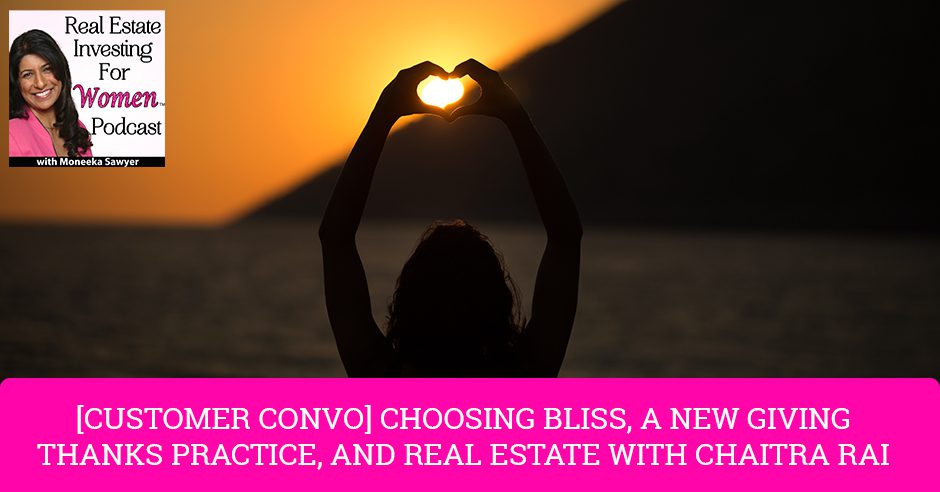
As host of the Real Estate Investing for Women podcast, we rarely hear what Moneeka Sawyer has to say about her experiences in real estate. In this episode, she sits on the hot seat as her customer, Chaitra Rai, asks some of the most curious questions that let us take a peek into her life, most especially with her real estate journey. Moneeka talks about her book, Choose Bliss, laying down what her typical workday looks like and how she inserts meditation and gratitude into her everyday life. She then goes to real estate and tells us some of her ways of finding a good investment deal, giving a loan, and applying for your second investment property.
—
Listen to the podcast here
[Customer Convo] Choosing Bliss, A New Giving Thanks Practice, And Real Estate With Chaitra Rai – Real Estate Women
Real Estate Investing For Women
Chai, welcome to the show. How are you?
I am doing wonderful. It’s great to hear your beautiful voice again. How are you doing?
I’m doing great. I’m sorry, it’s taking long for us to finally get this together, but I am excited about this conversation. You’ve got good questions. Thanks for being patient with me.
It’s all worth it. It’s all for the greater good.
Some of the questions that you sent me, you had some stuff about my book, Choose Bliss and you also had some real estate questions. Shall we start with Choose Bliss? Does that sound good?
That sounds great. After reading your book, I have a lot of questions that I wanted to talk to you about. One of the biggest questions I had after reading your book, you seem somebody who has varied interests in addition to your business ventures. I was wondering if you could share with us how your typical workday looks like and how many hours you spend on different things like your business ventures, blog, writing and podcasts. Do you have time for hobbies after that?
The first thing that I want to say about that is we each design our lives based on what makes us feel the best. How I would define a blissful life is that we get to do the things that make us feel most fulfilled. There are a lot of people that are out there talking about having a balanced life. A balanced life is a farce because there is a lot of stuff in a balanced life that doesn’t make our hearts sing. I designed my life. The way that I designed my life is more about doing the things that make my heart sing, spending more time doing that and less time doing the things that don’t make my heart sing.
I do have a typical day, but it depends on what my main focus is. I’ll give you an example. I have a property that’s being turned over, which means we’re in transition. I had a tenant leave and I’m putting a new tenant in. When I talk on my show about, “I only spend 5 to 10 hours a month,” what that means is most months, I spend zero hours and then if I have a transition, I might spend closer to 20 to 40 hours on that transition. It takes a lot of time to do a transition and do it right.
I only might do a transition every two years. I don’t do that often. I don’t spend a lot of time on real estate. In the morning, I wake up and I have a morning routine. That morning routine includes my shower, meditation, a little bit of journaling, a walk with my dog and my husband, coffee at the coffee shop and a walk back home. I sit at my desk and I look at a library of things that make me feel good, whether it’s a YouTube video, clothes or it’s a sweet letter that someone sent me like good reviews on my books or on the podcast.
I have an arsenal of feel-good material that I start the day with. I might take three minutes for that unless I’m watching a longer video, but that’s what I do with the first thing that I sit down at my desk. After that is when I start dealing with email. That’s how my day starts. After that, there are other things that happen. I do my email and then it’s what’s the focus of the day. Now, the focus of the day is I’m calling references for employers and for past landlords. I’m doing credit checks. I have to go to the property every single day because there’s something going on. It’s either I’m meeting a contractor, I’m putting up a new sign, or I meeting a possible tenant.
We each design our lives based on what makes us feel the best. Share on XI’m spending a lot of times specifically on the real estate piece. However, I do think that I’m going to have a renter. It’s taken me about a week and then I will go back to my regular schedule. Once a week, I record shows and then the rest of the week, I might have a couple of hours set aside for writing. I do a lot of reading and a lot of background stuff that has to go on with running a business. I’ve got to keep my website and products going. Sometimes I’m dealing with technology all the time. It’s our best friend. It can also be a time thing for a lot of things. There are all of those things. I usually start work at about 10:30 or 11:00. My husband is at home because of COVID, so he and I take about 1.5-hour lunch.
That’s called work-day balance. Having a balance includes that.
I have a good solid amount of time that I work in the afternoon. It’s starting about 1:30 until 6:00. I take a break in the middle of the afternoon to do a twenty-minute meditation. There’s also something interesting now that David is home, we’ll often go for a twenty-minute walk in the middle of the day. He goes back to work and I do the meditation. I get a 40-minute break in the middle of that afternoon.
That’s super productive for the brain as well to break it up in chunks like that.
I get some good focus time, but I also get some nice breaks so I can rejuvenate. One of the things you asked me before the show is to talk a little bit about dance.
That’s the exciting part, your love for dance.
It’s such a big piece of my life and there’s an unfortunate truth. In the book, I talked about a one-car accident, but I’m recovering from another one. Most people don’t know, which is fortunate. I’m doing fine, but it was a highway pile-up about several years ago. My right arm has not been working very well since then. In the first two years after the accident, my legs were not badly damaged, but I was in a lot of pain. For whatever reason, my legs, arm and back got jammed in the accident. I’ve been in physical therapy, acupuncture and all of that stuff. I had surgery on my shoulder. There’s been a lot that’s going on. What that has meant is that I can’t dance every day.
If you read the book, you know that from my perspective, and we’ve heard this from many experts, exercise is a big factor in keeping happy. Our bodies need to move. I was a dancer. I didn’t even have to think about exercise and that was even better. Now, I’m not able to dance and I’m not moving. I have been able to move. I’m starting to be able to move my arm so I can start to dance again. Even before I would try to move and my arm would get torqued because it’s sympathetic movements in your whole body when you’re dancing.
That was painful, but in order to make sure that I am getting the exercise that my body is used to getting, I do four twenty-minute walks a day. I do one in the morning with my husband, one in the afternoon and one after dinner. That’s three and then somewhere in between. For instance, in the morning, we might do twenty minutes before coffee and twenty minutes after. It ends up being a full hour or we’re out with a dog and having some coffee. It’s 3 or 4 twenty-minute walks a day.
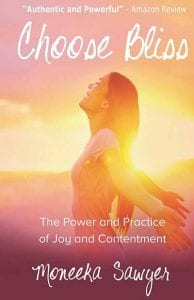
Choose Bliss: The Power and Practice of Joy and Contentment
You found an alternative to getting your dance practice. You’re doing more walks now.
That’s one thing that I want to emphasize to people is we get so busy in our lives that we forget that our bodies were built to move. If we don’t move, the body cramps up, so we physically don’t feel well. If we physically don’t feel well, it impacts us emotionally. The other thing is that exercise releases all these endorphins in your body that are natural mood enhancers. This makes you feel better in general. Exercise is such a big piece of creating a blissful life. It’s the piece that people tend to overlook the most because it feels like a time sink, but it’s such an important part of staying blissful. Does that make sense?
I totally agree with you. It’s this principle of contraction versus expansion. I feel like when you go out and have your walks, you’re expanding your mind and your consciousness. As opposed to staying inside the house and your body is not getting any movement, and you’re contracting in some sense. You get the blood flowing too when you’re out and about.
Get some air and your creativity flows a little bit more because you’re not so focused on one thing. You open and expand, and more can come in. It’s having peripheral vision rather than tunnel vision. You can take in so much more.
When you’re out in nature too, you get all these creative ideas and thoughts, which would not have come if you had been stuck in the house.
Did you have any other questions about the book?
In your book, you have mentioned your gratitude habit and I thought that was fascinating. You mentioned that as you wake up first thing in the morning, you write out three things that you’re grateful for. I’m wondering if you could expand a little bit about that. Do you do a gratitude habit in the morning? Is it something you practice throughout the day? Do you write more than three things that you’re grateful for? Anything you could tell us about that would be helpful.
I’ve created a whole new practice that nobody knows about yet. I’ll let the secret out for you. I even don’t get up. My alarm goes off and I push the snooze. It’s during that snooze period that I do the gratitudes in my mind. The way that I do it is I feel into the emotion. Any gratitude practice is good, but there is a right way to do a gratitude practice. That is to get into the emotions of feeling gratitude. I find this in my own life. I was in a car accident years ago and woke up every single morning in pain. When you do a gratitude practice and when you’re feeling pain or you’re feeling bad, it feels uncomfortable to be feeling that level of gratitude and joy. I don’t know if you’ve ever had this experience.
You’re lying to yourself in some sense until you believe it.
When you start to believe that you’re afraid, it will run away. That’s been my experience. There are a lot of times that I’m like, “I don’t want to get too happy because it’s not feeling real and comfortable.” The first thing to realize is that our most natural way of being is to be in bliss. Let me explain to my readers why I’m saying this. When we were born, we were born as these little bundles of bliss. We’re filled with joy, excitement, awe and wonder. We’re newly alive and we want to learn. There’s no fear and we’re going to try everything. That’s who we’re born as and somehow through life, we learn about fear, shame and we’re bad. We learn all of these things and it chips away at that bliss that is deep at our core.
A blissful life is when we get to do the things that make us feel most fulfilled. Share on XThat bliss is that light that’s talked about inside our core. It shines bright as always.
Gratitude is the quickest access we have to that little light of bliss deep down inside of us that wants to shine through our entire bodies.
It’s a gateway that do that special vision in us.
It’s okay that as you move into gratitude, sometimes you’ll get flushed with this feeling of joy and it’s uncomfortable because we’re not used to it. The more that you do it, the more natural it becomes and the more willing you are to go there. What’s even more delightful is that you start to stay there longer. Your body gets in the habit of being able to sustain that level of emotion on that vibration. Everything that happens inside of our bodies, whether it’s endorphins from exercise or being on a diet, whatever it is that we’re doing, our body needs to adjust to accommodate the level of bliss that we’re capable of.
The more that we practice, the more our capacity expands and the more comfortable we are with that. That also means that when we fall or things go bad, we’re more quickly able to move back into that place of bliss rather than staying in those distracted emotional states like depression, sadness, anger. Even ecstasy can be a huge distraction because it doesn’t support what you want in your life. It’s a good feeling, which is great. I’m not saying I don’t feel that. I’m saying that we want to live in this place that it’s expansive and supportive of our sustainable joy.
It’s like you’re attuning your body to the frequency that is emitted by that inner vibration. Your body needs to get acclimatized to that.
I do it first thing in the morning and that gets me started. I have an alarm on my phone. When it goes off on my screen, on my phone, it says, “I am so grateful for.” During the day, 2 or 3 times, I might be reminded to do a little bit of gratitude. The other thing that happens is I get in these moments when I’m working and I want to throw my computer across the room. At that moment is when I take some deep breaths and I say a couple of gratitudes because that calms me down. It clears my mind as a fog that happens in us when we get frustrated so that I can then think more expansively. If that doesn’t work, that’s when I go for my walk.
Gratitude can also help put you back in a rational place, so you can be more creative and more productive. That’s all the stuff that was covered in the book and what I’ve been doing for many years. Now, there’s a new piece and this is a piece that I do in the evening. I started to do a new I love you practice. At night, I write a little love letter to myself and what the love letter says is, “Dear Moneeka, I feel so lucky to be you and to be able to live my life through you,” and then I put gratitudes about myself and my life.
I might say something like, “I am grateful for your spirit and your willingness to share your point of view with the world. I know sometimes that’s hard for you and I appreciate that you do that,” or “I so appreciate your commitment to getting the word out there that bliss is a priority. I know that people sometimes look at you like you’re a crazy person, but thank you so much for being tenacious and committed.” I’ll say things like that. At the end of it, I’ll say, “Thank you for being you. I love you so much,” and then I sign it, Moneeka. You have no idea how good that feels.
After you write a love letter like that to yourself, and you go to sleep, you wake up in the morning wide open. It’s almost like an emptiness. There’s a space where it’s completely open that you can fill it with the good stuff. Most people, when they wake up in the morning, the first thing they think of is, “It’s another day, I want to sleep a little longer, or I’m late.” There are all these other things. Those are all negative things. Instead, if you do a gratitude practice, you’re filling yourself up with good things. The other thing that’s important to make sure that you’re not distracted from the gratitude piece is to be careful about what you’re waking up to.

Choosing Bliss: Gratitude is the quickest access we have to that little light of bliss deep down inside of us that wants to shine through our entire bodies.
You want to wake up to a sound that’s pleasant to you and that does not feed your subconscious mind negative information. For instance, do not wake up to an uncontrolled music or news station. Don’t listen to the news. The second that you wake up, don’t wake up to that because most of that is negative stuff. You don’t want to put that negative energy in you when you first wake up. The other thing you don’t want to do is have advertising because advertising is designed to make you feel like you are not enough of a person, because of that, you need this product to be a better person. You don’t ever want that to be fed into your mind when you’re first waking up.
You don’t want sad songs. If you can control it, you don’t want things that are going to make you feel bad, hurt, or have bad memories. This sounds controlling, but you do want those first moments that you wake up, that you open to the world, that’s going to set up your entire day. You’ll make it a lot easier for yourself if you wake up to something beautiful, some beautiful tinkling, soft nature sounds, and birds chirping or crickets chirping is something I know one of my clients likes to listen to. My husband wakes up to Mexican music. He speaks Spanish, I don’t speak Spanish, but I love the way mariachi sound. It’s wonderful to hear that in the morning. Controlling what you wake up to is also going to help to support that gratitude practice.
It’s like you’re controlling your mentality on some level so that you can put your best foot forward as you start your day. Another thing I loved about what you share with us is your love letter the previous night because they say what you sleep with at night is what goes forward. It’s important to have positive things, not only when you get up, but when you sleep as well. That’s why I love your new practice that is incorporated into your routine. Thank you for sharing it.
One of the things that I love talking about more than anything else is how people can live a blissful life, and I feel that we can keep talking, but I think we should move on to the real estate piece.
You’re taking your first loan, venture into your first real estate investment and you go to the bank and because of the period we’re in, there are certain downturns in some areas, banks are asking for a higher down payment. Once you do buy your first property and you go ahead with the process, how do you know that this is a good deal? How do you find a good investment deal when you’re doing this for the first time?
There are a lot of different pieces to that. First is finding the right property, the right loan and what happens next after that? It’s a three-step question I heard. We’re going to talk about the economy later. There’s no such thing as a perfect property, but there is a perfect property for you personally. I teach this in my coursework. The short version of this is that you want to look at your resources and your tolerances before you pick a property. My bank is offering a loan at 3.25% interest with a down payment of 30%, is this good?
Every bank is going to be offering different things. Most of the banks are requiring a down payment between 25% and 35%. Yours is right there in the middle. A rate of 3.25% is fantastic. It’s fluctuating about an eighth of a point. You might be able to go down to eighth, but you also might end up at 3.75%. I got quoted at 3.875%. For our readers, understand that we’re talking during COVID. I want to give you an overview of what I look at when I’m looking for a loan.
What is the market bearing right now? The market is asking for between 25% to 35% down. A rate of 3.25 % is right in the middle of what I’m seeing. You’re going to find out more about that by calling a broker and getting an idea because a broker has access to many different products. He will have access to a product that’s only 5% down, but he’ll tell you the rate is higher and you’re going to have to put five points down, which is 5% down in fees. Brokers are going to be able to tell you the range of what rates are looking at and what down payments are looking like. That’s the first thing.
The other thing is going to be, can you put that 30% down? If you can’t put it in your area, how much do you have to put down? What is that 30% of? If you have $30,000, 30% means that you can only buy $100,000 price. That’s going to also determine if this is the right time for you to buy or not and what to buy. The next thing that I always look for is the perfect property for you is the property that is in a neighborhood where you’re going to find tenants that you like doing business with and it’s a property that you enjoy maintaining.
Let me give you an example of what that looks like. I have a property that is vacant. When I bought that property, it is walking distance to Starbucks and the Sprouts and to a bunch of cute walking area. The property is only a three-bedroom, one bath. It’s fairly small. The tenants that I was looking for at that time, and I predetermined this, was a small or a new family, husband, wife and 1 or 2 kids with no pets. You’ve got your customer avatar. My tenant is my customer.
We get so busy in our lives that we forget that our bodies were built to move. Share on XThey’re starting their life. They’re involved with their work, helping the kids with homework and family time. They don’t have time for all the maintenance of a house and all the gardening. They’re looking for something that’s a little bit lower maintenance. A condo might be a good idea. They’re making about this much money. These are the tenants that I want to work with. The other thing is where does that tenant want to live?
If they’ve got young children, they’re going to want a safer neighborhood. Ideally, for me, I wanted a safer neighborhood and here is why. Every evening, I’m going over to the property after my workday to do something, not every evening, but frequently. If I’m going over there in the evening when it’s dark, I need to feel safe as a woman. Men are going to have different considerations. They want to feel safe too, but it’s going to feel different to them what’s appropriate and what’s not. I need to feel safe in the neighborhood, in the home and with my tenants. That’s another thing that I consider.
When you’re looking at the perfect first investment property, you want to take all of that into consideration and you want to look for the property that is perfect for you. Does that mean you might have to wait to get the right property? It does, but you don’t want to wait for the perfect property. The first property that I bought was a smaller property, a three-bedroom and two baths. Now, much of what I own is executive homes.
The ideal property was an A-class neighborhood and executive home. That was perfect for me, but I couldn’t do that at first. In the beginning, I had to do something that was a perfect fit for the first investment. That means I needed to feel safe, I needed to be able to deal with the kinds of tenants that I wanted to do business with and how much money I have to put down. You might have to wait to get in because you may not have the money to buy into that neighborhood. Make sure that the second you can buy into a neighborhood that fits your parameters, that you do that because sooner is always better than later.
Those are great points about the safety aspect. I wouldn’t have thought of that.
Most people don’t, but for women, it’s a big deal especially if you are managing. My husband is not managing my properties. He helps me out every once in a while when I’m desperate, but that happens rarely. The other thing you asked about is the loan piece. You get your first loan, your first property, and now you’re like, “How do I get the next one?” It depends on what area of the country you’re in. Fannie and Freddie, which are the government-backed loans, in most areas, they will allow you to go up to ten conforming loans without rates going up. That’s pretty easy. Conforming is different in different parts of the country. In some place it’s 149, in California it’s 510. In California, our parameter is five loans. After five loans, we can still get the next five loans, but the rate will be about one percentage point higher. The rates on the first loans are all at 3.25%. The next one would be at 4.25% or 4.75%. It’s going to go up a point to a point and a half after the fifth loan. That’s when you go to loan number six. That’s in California.
If you’re talking to a mortgage broker, they’d be able to give you their parameters. When you’re talking to a mortgage broker, find one who is well-versed in investment properties. You want to find out, do they have investors? How many investment loans do they do per year? Is that their main business or they’ve got 1 or 2 clients that they do or they might do 1 or 2 a year. They’re not going to know enough. You want somebody who can answer all these questions like, “How many loans can I do? What are the different investment property products? How is my primary residence loan going to be affected by those other products and vice versa? How many points can and how much more down payment?”
You want them to know all of that stuff. Some of those loans will have restrictions based on the CC&Rs, which is all the HOA rules for condominiums, townhouses and PUDs. If you have a mortgage broker who understands investing, they’ll know the right questions to ask, and they’ll also know how to guide you as far as what kinds of properties to look for. My loan officer asked me for all of the information that then he’ll say to me, “Moneeka, what’s going on out there? What would you expect those to be?”
Let’s say my HOA dues are $650, that’s going to take down the price of my house that I can buy by about $100,000. That’s calculated into the debt-to-income ratio. I have to pay that additional amount. If it’s only $200, it’s going to be a different thing. He knows to ask me that so that we don’t have an ugly surprise when we send it to the underwriter and they’re like, “There are these HOA dues that we did not calculate into the debt-to-income ratio. You don’t qualify for as much.” That’s one example.
When you talk about your loan officer, do you normally take loans from the bank or private investment companies are an option as well?

Choosing Bliss: Advertising is designed to make you feel like you are not enough of a person; because of that, you need this product to be a better person.
You can do either one. I’ve done everything through the bank right now because it’s super easy. It’s streamlined, but I have a lot of different options as far as private money and other investment options too. I just haven’t taken advantage of them. That was all of that. Did you have any other questions on that stuff? I know I covered quite a lot there.
You answered all of those three. We covered finding the perfect property, getting that loan and the third one was applying for your second investment property. You told us about the conforming loans. That was very useful. The loan officer would be able to give us that information too.
If you’ve got a loan officer that is used to dealing with investors, then they’ll be able to give you all that information.
Thank you. That was super helpful, especially in the location, how important it is when you’re selecting your first property. Real estate investing is known as hassle-free, once you have the perfect property and things are going well. How do the ups and downs of the economy change that? Would it change in case the economy has some major changes?
The economy is a big question that people want to hear a lot about. I’ve done several shows on this. Here’s the thing that I always say about predicting the economy and predicting real estate’s movement. Someone out there is going to be right on their predictions, but we don’t know who that person is going to be. I talk about my experience of many years in real estate of what that looks like. I’ll talk to you a little bit about what my experience has been and what I have gleaned from that. It was either ‘87 or ‘89, my dad was paying for my college education through real estate and then the tax laws changed. Prop 13 came in California and they removed some of the tax benefits of being an investor.
The real estate property values plummeted. There were a lot of us that were in school at the time whose parents were paying through real estate. There was a lot of stress about money during that time. Things recovered and then the market started to march up. It was going up. It was doing phenomenally well because people adjusted and property values all recovered. In 2001, it was when we had our next crash. When I graduated from college and got married, my husband and I bought our first home with 5% down. Our property was going up. We took an equity line on that first property and we bought our second property, the beautiful home that we bought. We bought that in January of 2001. Right after that, the whole market crashed again.
We went along. We stayed in that property. I took another equity line. I bought a few more properties. In 2008, I bought my dream home. It was a million-dollar condominium on the top floor. In 2009, the market completely crashed again. My timing was not good. I wish my timing was better. I do think that it is wise if you can time the market. I’ve never been able to do it with any level of success, even so, we started our real estate investing journey with about $10,000. By twenty years later, I would have been able to retire, in spite of the fact that the market crashed twice during my journey in real estate.
The California market is volatile. We count completely on the appreciation. You’ll see that the properties are volatile. What we see mostly is properties in the very low-end and high-end tend to crash most often. In 2001, if it was below $200,000 and above $700,000, you would see a lot of volatility. If it was between that $200,000 and $700,000, it stayed fairly stable. It might have lost 5% or 10%. In 2008, it was a completely different thing because the crash was caused by a real estate-specific problem, which was the loan industry.
We saw all houses dropped fast. That particular phenomenon will hopefully never happen again. That was something that was real estate-specific. There was a problem with the banking system and we fixed that in many ways. That kind of crash is not likely to happen. Are we at the top of our economy? We’re pretty close. Real estate is going gangbusters here in California or Northern California in the Bay area. However, I don’t know how it’s doing in the rest of the country. I don’t think it’s going gangbusters the same way. One of the things that I’ve been giving advice to people and I have been given advice also is to look at markets like what you talked about where in Central Texas, for instance, the pricing stays stable even in 2008. When you are looking at that, what’s also going to be true is have the market values appreciated significantly since 2008?
They have, especially in areas like San Antonio and Houston. They’ve appreciated. There’s a lot of demand.
When you start to believe that you're afraid, it'll run away. Share on XIf you can find a magic area like that, where it’s fairly stable, but then you’ve also seen a lot of appreciation, you’re going to have a good chance of not being heavily affected by the economy. Most areas that are not going to be affected by the economy as much are going to be places that are more cashflow places. What will happen is you’ll get a property that is going to cashflow right out of the gate, which you can never find in California. If the economy takes a turn, that cashflow will stay stagnant or will continue because people still need to rent homes. People are not flooding into those areas so the property is not going to necessarily go up high, but it’s also not going to go down very low. It’s going to stay fairly stable.
When you’re looking at an economy, you want to look more for those safer markets where you’re going to get some cashflow and that cashflow then offsets any loss that you could make or you could endure. Those markets are also likely to recover after if they take a 10% drop. If you’re investing in a place like California or an appreciation-focused market, you’re going to see a lot more volatility. What’s important then is to have the wherewithal. What I mean by that is liquidity. You want to have some cash, the emotional wherewithal and the mental mindset to hold on for the long-term. You want to make sure that if things go wrong, you have time to recover so that you can become right again. You need about a ten-year cycle to recover from a hard hit.
What you’re saying is location matters very much, especially if we’re seeing some uncertainties in the economy. Keep in mind that if you’re in an area that has substantial cashflow, that’s probably a better area to invest in.
I still want to buy property in California. This is the market that I love. I need to have a ten-year timeframe on that. I need to make sure that I don’t need to make money on that property right away. I want to make sure that I’m covering my mortgage and my expenses. If the market turns and I lose a significant amount on the property, if I’m upside down, then I can continue to pay that mortgage either through rents or by selling something that I have liquid. For instance, stocks or there might be other things that we have that are liquid, that we can then put into our real estate to sustain ourselves. I’ve been known to do that. When things go bad, I make sure that I can cover myself.
That’s great planning.
I tell people don’t put all of your money into real estate. It’s very solid. It’s the most secure investment on the planet, but there are times when it cycles also. It’s good to make sure that you’ve got some cash and some different things so that if you need liquidity, you’ve got that. The other thing I always say is always have an equity line taken out on your primary residence. You can’t get them on rental properties. That can also serve as an emergency fund if you need to pay mortgages or stuff on your rental properties. Don’t use it for things like vacations, buying a car and consumer debt. Use it to make sure that you’re sustaining your investment business so that you don’t end up losing properties if things turn and you need a little bit of help during that time.
I can’t believe how much information has value that I’ve been able to get out of your show and your readers too. You explained everything so beautifully and easy to understand. We could have asked for a better mentor than you.
Did you have any other questions before we close?
This is coming back to your book, your new habit, the beautiful letters to yourself. I wanted to know if you were planning to come up with a book on affirmation.
I’m not. Many people asked me that. There are many out there that are good. I’m a co-author of a book called Experts & Influencers: Women’s Empowerment Edition. It came out and we are doing their little quote cards. Each of us ladies that were in the book wrote six quotes and you can get a card deck with all of these quotes. If anybody is interested in a card deck, please email me and I can send that to you. It’s $20 per card deck, but you get 52 cards in any case. However many that you get, you get all of these quotes by powerful women that help you to empower yourself and live your best life.
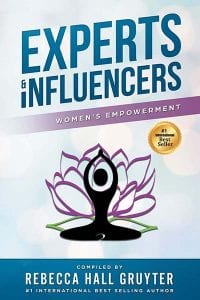
Experts & Influencers: Women’s Empowerment Edition
That sounds like an amazing deal. I wouldn’t want to miss that.
You can go to BlissfulInvestor.com. You’ll see my email address there. Let me know if you want some cards. This is a good conversation. Thank you so much for asking your questions. This can benefit my entire readers and all the ladies out there. Thank you for being willing to do that.
Thank you for being a great mentor to all of us ladies who tune in to your show regularly. I’ve got so much value from it. I’m coming from your knowledge in real estate investing to feeling like I’m learning so much and I’m ready to move ahead. Thank you for everything that you do.
It’s my pleasure. It’s comments like that that lets me know people are reading, and I love that. Thank you. It makes it all worthwhile.
I look forward to catching up with you soon. Thank you for this opportunity to ask you questions. I love your book and I’ve been recommending it to all in Sundry.
Ladies who are reading, I love doing this show and having the conversations that I get to have with these amazing experts. The reality is that I am doing this to be in service of you. If you have any questions, email me and maybe you can be on real estate investing for women as one of the guests. We can have another conversation like I had with Chai. It can help all the other readers too. There’s never a dumb question. All the questions that you’ve had, all the other people have had before you. Feel free, and other people have after you. Many readers have the same questions. Please let me know if you have any questions, and we can record a call and help all the ladies out there.
—
When I read your book, every chapter touched something in me and the chapter that you mentioned about giving also touched a deep chord in me. You found a school in India that you donate and you help run. It’s been a dream of mine to do something like that to provide education and school. You found a school that makes your heart happy and you’re donating. How did you find your calling to serve this particular organization or this particular school? How did you know that this was the right fit?
There’s no real right answer. I want to mention how my husband found his, because he didn’t have a heart calling. One of the things he does is he goes online when he’s looking at an organization that feels like it resonates with something that he wants to donate towards. One of the things that he looks up is how much of the funds go to administration and charitable services. He’s always looking for organizations where most of the money goes to services rather than to the administration. That’s a tip-off the top of my head that he has always done.
I went to India when I was sixteen. I was a foreign exchange student. I was out and about and I was meeting people. One of the things that struck me was how the women in India were being treated as opposed to what I was used to in the United States. I would hear these horror stories about Sufi, about these arranged marriages of these girls that were very young and how girls didn’t get any education. There was all this stuff that horrified me. At a young age, I decided that I was not going to be like that. I was going to be the captain of my own life. Nobody was going to determine who I married, how and when. I was going to get an education. I determined those things for myself, but I also realized I had the freedom to do that in the US and that in India, women didn’t always have those options.
Always remember, goals without action are just dreams. Share on XI became committed early on to the education of women in India. One of the things that I was convinced of was that the more educated a woman is, the more likely she is to be able to make choices that are more supportive of her than if her life is completely run by her father and by people that were “more educated than her.” The other thing that I realized is that women can fight for their rights, but if we are constantly fighting against men who do not believe the same things, we can never win. It’s important that the education of men also supports the equality of women. Women need to know what is possible for them. Men need to understand and believe that women are equal to them.
I started donating to schools in India at the age of sixteen. I would do $5 a month. I started to donate to different schools in India that supported the education of women and the upbringing of women as equals. In the United States, we used to go to a temple. When I moved to California in 1976 or ‘77, my parents plugged into a Hindu temple that was up in Oakland. That particular Swami, we became close to. It was in 1987, he started this school in India. When we started talking about what the philosophy of the school was, I knew I had to get behind it.
That’s why I started donating quite a lot of money to help to support the school and those sorts of things. Because of that, I was able to impact also some of the direction of the school, the way that the approach was for the education of both girls and boys for the uplifting of women in India. I’m close to the Swami. I’ve gone to India and I did a little movie in the school. I’m involved. The thing that I loved most about it was that I knew the people that were running the organization and I knew what the accounts were.
They didn’t have a huge amount of administration. Most of the money was going towards the school or in the United States. It depends on where you donate. You can donate to the school or you can donate to the temple here in the United States for the upkeep of the building and the temple here. You can designate those funds. I see and I watch every single year more buildings go up. They get more computers, they’ve got more students, and there’s a new farm. It’s becoming a little bit more sustainable. They had to build a bunch of wells because their water levels went way down because their wells weren’t producing.
This is a thing that happens in many of the villages in India. We know that that’s another problem. I’ve been watching the whole thing and where the money goes, and that’s why I feel so committed to it because I know that it’s going to essential services. That’s how I made that choice. It happened as a process throughout my whole life. For David, he will find something that he wants to donate to and he’ll find an organization where most of the money goes to the essential services.
It sounded like it almost happened in a natural way for you. It unfolded naturally.
It did. It’s in my book. It’s one of my pillars of Bliss. It has defined so much of who I am because when you’re looking at the world for a way that you can help and that you can make it better when you’re making an impact, there’s something that happens inside of you. You’re not as a mercy of the world. You’re able to create impact and affect change. It feels empowering. It feels good on so many levels and it’s also helping the world. It’s that thing that we’re giving back. When you feel grateful for everything that you have, if you’re truly grateful, you want others to experience having some of the benefits that you have. Having the opportunity to do that makes you feel even more grateful. It also fills you up with this feeling of empowerment and feeling like you’re doing good things in the world. It’s always been integrated.
You’re making a difference.
In the book, one of the things that I talk about is making an impact is not about giving money to a school in India or Africa, or helping with a water system somewhere. It’s also holding a door for somebody. It’s giving somebody a smile if they seem to be having a bad day. It’s being kind. All of that is creating an impact in the world. It creates a ripple effect of kindness and bliss everywhere you go. That in itself is making an impact. It doesn’t have to be something big. It doesn’t have to be something monetary. It can be who you are being in the world when you’re out there with people.
It’s being aware of our behavior when we’re out there with people.
Practicing kindness and giving back in that way.
Thank you. I have a lot to write in my journal from our conversation.
Thank you for asking that question. That’s not anything I’ve talked about on this show. I’m sure the ladies will get a lot out of that. Ladies, thank you for taking this extra step towards your future, bliss, and financial freedom. Always remember, you do have control over your success. I’ll see you soon.
Important Links
To listen to the EXTRA portion of this show go to RealEstateInvestingForWomenExtra.com
To see this program in the video:
Search on Roku for Real Estate Investing 4 Women or go to this link: https://blissfulinvestor.com/biroku
On YouTube go to Real Estate Investing for Women
——————————————————
Learn how to create a consistent income stream by only working 5 hours a month the Blissful Investor Way.
Grab my FREE guide at http://www.BlissfulInvestor.com
Moneeka Sawyer is often described as one of the most blissful people you will ever meet. She has been investing in Real Estate for over 20 years, so has been through all the different cycles of the market. Still, she has turned $10,000 into over $5,000,000, working only 5-10 hours per MONTH with very little stress.
While building her multi-million dollar business, she has traveled to over 55 countries, dances every single day, supports causes that are important to her, and spends lots of time with her husband of over 20 years.
She is the international best-selling author of the multiple award-winning books “Choose Bliss: The Power and Practice of Joy and Contentment” and “Real Estate Investing for Women: Expert Conversations to Increase Wealth and Happiness the Blissful Way.”
Moneeka has been featured on stages including Carnegie Hall and Nasdaq, radio, podcasts such as Achieve Your Goals with Hal Elrod, and TV stations including ABC, CBS, FOX, and the CW, impacting over 150 million people.
Increasing Diversity In Real Estate Investing With Deidre Woollard
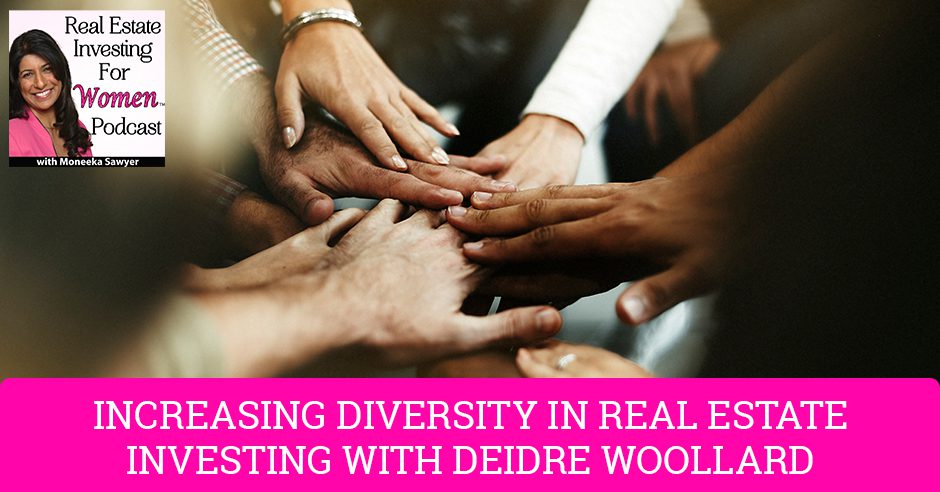
Real estate is a male-dominated industry where women are underrepresented and have a hard time breaking through. Calling for an increase in diversity in real estate investing Moneeka Sawyer interviews writer, editor, and real estate investor, Deidre Woollard of Millionacres. Here, Deidre reminds women investors of their great capacity to find success in the field, inspiring them to get out there and put themselves forward. She talks about investing according to the cycles of our lives, creating a diverse portfolio, real estate crowdfunding, Real Estate Investment Trusts (REITs) and more. Tune into this great episode to receive advice that is for women and given by women. Join Deidre and Moneeka as they provide other great insights unique for women in real estate.
—
Listen to the podcast here
Increasing Diversity In Real Estate Investing With Deidre Woollard
Real Estate Investing For Women
I am delighted to welcome to the show, Deidre Woollard. She is a writer, editor and real estate investor. Her passion for real estate writing began when she created the first Estate of the Day column online and worked for AOL Real Estate. She later worked for Realtor.com and created the Ask A Realtor column. After that, she moved on to spend several years leading marketing departments at luxury brokerages across Los Angeles before co-founding a real estate public relations firm. She now works with the team at Millionacres, helping to provide education on a wide variety of real estate investing topics. Her passion is helping educate people on the ways that real estate helps build wealth. Deidre, welcome to the show.
Moneeka, thank you.
Before I bring Deidre on, ladies, I want to tell you a little story. David and I got married many years ago. In those early days, one of the things that we knew was that money was important in the world. We both came from families that had open conversations about investing, money and how money worked. We also both had ambitions beyond what we had learned from our family. My husband was working at a startup. We were not making very much money. We were broke. We bought our very first home for $10,000 from our wedding. We had so little money left. We had these dreams. We wanted to travel and see the world. We wanted to focus our lives on the fun of living rather than focusing so much on paying the dues when we were young so that we could live later.
We started to investigate what investing could look like even with us, where we had so little money. At least we had bought a house. Both of us knew that was a good idea, but we had so little money. We were paying a mortgage. We rented out a room in the house. We took that money. We wanted to invest it so that we could travel and we can build for our futures. Motley Fool book had come out the year before. We picked up two books. David and I read together every night. This is another one of those things we’ve been doing for many years before we were married. In those early years, we were reading financial books.
Motley Fool was the very first book that we read. It completely changed our perspective on life, money and the world. A few years later, we shut down our houses. David took a leave of absence from work. We put some backpacks on our backs and we traveled the world for six months. I tell people over and over again that it started because we got a good education. Real estate has been a big piece of that, but on the stock side, this was the big influencer. I got an email from Millionacres, which is the real estate division of Motley Fool. They said that they rated my blog as a top ten blog in real estate. I screamed, jumped up and down, I was clapping my hands. My husband was like, “What is going on?” I told him and both of us were so delighted. I immediately contacted them. That’s why we’re talking to Deidre. You have had such a huge impact on my life. Thank you.
One of the reasons Millionacres exists is because we wanted to take that same idea from the Motley Fool and how it helped people and bring that to real estate. There’s so much information out there, but it’s so confusing sometimes. It’s the same mission but translated into real estate.
That’s the gift. With the Motley Fool, they made it approachable, understandable and unscary. We could take some action. I know that’s where you’re headed with this too. It’s needed out there because it can be confusing.
Our goal is to make you smarter, happier and richer, which we all want to be smarter, happier and richer.
Any good investor knows that there's active and passive elements to all investments. Share on XTell us a little bit about how you developed a passion in real estate.
I started from the journalist side, from writing about it. Through writing about it, I started to meet many interesting real estate agents and brokers. This was one of the early days of blogging when there weren’t a lot of blogs. The real estate agents that were getting involved in technology started reaching out to me. It gave me this passion for understanding real estate as a profession and realizing how hard real estate agents work and understanding what the profession is like. I’m seeing the ways how especially women could become entrepreneurs through real estate. That was inspiring to me.
I loved many things about the conversations I’ve had back and forth with you and Sarah. Sarah was the person that reached out to me. When I was connecting with her about who I could bring onto the show to represent Millionacres, she started talking all about the statistics for women in real estate, which is relevant and important. It’s helpful for us women to understand that we’re under-represented, but it doesn’t mean that we don’t have this huge capacity.
One of the things that I’ve seen is that there are a lot of women who are in residential real estate as a career. There aren’t as many women who understand real estate investing or feel confident. One of the things that is true for a lot of women was a study by the Harvard Business Review that men will apply for a job when they’re 60% qualified. Women will not apply until they’re 100% qualified. Sometimes we as women have that little barrier where we feel like, “I’m not sure if I know enough. I’m not sure if I can handle the risk. I feel like I need to wait on the sidelines longer.” That happens both in real estate leadership and in real estate investing. One of my passions is encouraging people to get out there and to put yourself forward.
We’ve had a lot of real estate agents on the show that are women. They have excelled well. Investing is a completely different thing. For whatever reason, it seems like women are more willing to become an agent. They see their clients invest. A male agent will look at the property first to see if he wants it before he offers it to his clients. I’ve seen this out there because I was a mortgage broker. The women will offer to our clients first before she makes an offer, which is not always true. I don’t want to be over general. I saw it a lot. I was like, “Why is this happening?” I was the only female agent that was out there making offers on investment properties. It was interesting. Could you tell us a little bit more about the statistics?
What we did is we surveyed about 650 people and we got their opinions on real estate investing, both gender diversity and racial diversity, what people are seeing, and if they feel like the situations need to change.
What were your results? Tell us about that.
The first thing I found that’s interesting is there’s a little difference in how men and women invest. Our survey found that men are more likely to invest in REITs, Real Estate Investment Trusts, whereas women are more likely to invest in rental properties. That may be a comfort level thing. Sometimes I feel like women are encouraged more toward owning homes versus owning commercial real estate or owning real estate investment trusts. I’m not sure about you, but I feel like a lot of the stock advice sometimes can tend to feel a bit male skewed.

Diversity In Real Estate: As an investor, you don’t necessarily need to be in the same types of investments at different portions of your life.
I was on a class and every single book that was recommended was by a man. They recommended ten books on the show. I thought, “There’s not a single book out there written by a woman that you value.” We see that in our industry a lot.
I see that on the commercial side and also the real estate investment trusts. Most of the books are written by men. I don’t think women understand that especially real estate investment trust or real estate crowdfunding are great passive investments. One of the things I feel is that there’s no such thing as active and passive being separate because they both require a certain level of active and passive. If you’re an active investor, you’re finding ways to automate or to use a property manager. I loved one of your podcasts with Kris Ward talking about how to use automation and things like that. That’s important. Any good investor knows that there are active and passive elements to all investments.
Tell me a little bit about what you perceive as the advantage for women in different investment strategies in real estate.
Some of it is the diversification and understanding what you need in particular time periods in your life. As an investor, you don’t necessarily need to be in the same types of investments at different portions of your life. If you have kids, you might not want to be dealing with individual rental properties when your kids are little or something like that. When you’re older, you may want REITs or something that’s providing you with a little dividend income. If you’re wanting to do short term rentals, let’s say you want to move somewhere else. You may have that short-term rental as that bridge property to get you there. I feel like investing is something that changes throughout your life. We all go through different seasons of our lives. A different type of it can help you with that different stage.
I love the way that you’re talking about the cycles of our life. It’s hitting home for me right now because I’m in a big transition. I started very young. We first bought our first home. There have been a lot of different strategies that we’ve used along the way both for stock and for real estate. For the most part, I’ve had everything in appreciation. I’m in California real estate, most of it is appreciation. We’re changing to cashflow and more passive strategies because David and I are looking at retiring in a couple of years. One of those things that we don’t talk a lot about in the show or anywhere is the cycles. One of the things that I feel that with men, it’s about the strategy and what’s going to make them money and what they’re excited to learn about. For women, we do need to focus a lot more on the cycles, what fits in, where and why and shift as the cycles do. Do you believe that’s true also?
Absolutely. That’s one of the reasons that we have many female writers on Millionacres. We’ve got women who are using different types of strategies throughout their lives. We’ve got one woman who’s investing in a lot of tax notes and she’s traveling the world right now. She and her husband were in Mexico. They own some properties, but they also invest in a variety of other things. It’s about what you want in your life and how real estate can help you no matter where you are and what you’re doing. There have been periods of time in my life when I’ve been more interested in owning property or periods of time in my life where I’m much more interested in something that doesn’t feel quite as labor intensive.
Tell us a little bit about what Mogul does.
Mogul is our premium service from Millionacres. It works like the Motley Fool. The Motley Fool has a free site and then there are premium services that do stock recommendations and things like that. Mogul is like that in that we do real estate recommendations for real estate investment trust and some real estate equities. We also do recommendations for individual real estate crowdfunded deals. Those are usually for accredited investors. You have to have a certain income to qualify for those. You’re investing a sum of money and it is held for a period of time to do something like redevelop an office building or build an apartment complex or something like that. At the end of that, you receive distributions throughout the course of the investment. You get your capital back plus the profits when the deal gets sold.
Diversification is the gift that takes a little bit of pressure off. Share on XMogul focuses on a lot of different strategies. Could you talk a little bit about some of the specific strategies that you like to recommend to ladies to create some diverse portfolio or how do you recommend that?
It depends on how much money you want to spend and what kinds of things you like to do. One of the reasons I like real estate crowdfunding, especially even with something like one of the smaller regulation A-deals where you don’t need to be qualified to be accredited investor. You can still invest a couple of thousand dollars in a REIT to develop certain types of properties. It’s exciting but also diversification is important. One of the things with rental properties or fix and flips is it can be a lot of pressure. Diversification, the gift of that to me is that it takes a little bit of that pressure off. It’s the same way with stock investing. I like to have my money in different sectors because different sectors perform differently at different times. We’ve been studying what’s happening with the COVID-19 pandemic in real estate. You can see that certain sectors are doing well and certain sectors aren’t doing well. Hotels, malls, and things like that aren’t doing well, but you’re watching warehouses, self-storage, data centers, those things are doing well.
Could you tell us a little bit more about how REITs work? I don’t think I’ve had somebody come onto the show and talk about that.
I love talking about REITs. They’re my favorite. REIT is Real Estate Investment Trust. Most of them are publicly traded. You could buy it like a stock, but it’s a little bit different than the stock because they have to pay out 90% of their income. They have to pay you dividends. One of the reasons people like them in retirement accounts is because you get dividends. Most of them are quarterly, but there are a couple of REITs that pay monthly dividends. You can hold them in a retirement account, which is nice because that way you’re not taxed on those dividends. You can hold them in a Roth IRA or something like that. That’s a great way to grow your retirement portfolio.
They have to pay 90% of their income. Why don’t you explain that?
It’s a little bit different than a stock because the REIT is holding real estate. You don’t look at the earnings per share as much. They move a little bit more slowly than stocks. Another piece of research we did was looking at how REITs versus stocks performed over time. We found that over twenty years, REITs will outperform the S&P 500. It hasn’t been true in 2019 where the S&P 500 has outperformed REITs. Especially in 2020 because tech stocks have been zooming including Zoom. Real estate has not been doing so well because of the pandemic and because of how many things were closed, which makes it a good time. A lot of those real estate investment trusts are undervalued for what they are.
Where would you look for those?
In Millionacres, we have a whole section on REITs. They’re part of the stock market. You can start looking at things like malls. Simon Property Group is the biggest mall REIT. There’s Empire State Realty Trust, which owns the Empire State Building. REITs underlie so much of the real estate in the United States. It’s fascinating. You can invest in warehouses. There’s a REIT called Prologis, which is the biggest warehouse REIT. Amazon is their huge customer.

Diversity In Real Estate: Passive does not necessarily mean set-it-and-forget-it. You set it for a certain amount of time, and you revisit it because things change—the economy, your needs, the investment, and the way the market’s moving.
Would you go on Schwab, Fidelity, or whatever and look for REITs? Is that what you would put in there?
They’re like regular stocks.
I had no idea about that. I do this stuff. I didn’t even know about it. I knew about REITs, but I hadn’t done enough research to know very much about them. Do you talk about them on Millionacres?
A lot of our stories are on REITs. We do a lot of talking about this particular sector. That’s one of the things that even within REITs, which is a sector, there are different sectors. There are all those different categories and that’s one of the things that makes it exciting.
It’s so accessible and so easy. It is pretty passive. It’s as passive as you might say with stock. You need to do the initial research.
One of the people at Motley Fool got me into this idea of journaling my investments. Much of the stock market are emotional and you see the market go up and down, and it’s very easy to get caught up in that. When I’m thinking about a new investment, I write down why I want to invest in it, what I think about it. Quarterly, usually when the earnings come out, I love to listen to the earnings calls. I like to hear the voices and the people answering the questions. I go back to that journal entry and it’s like, “Did everything that I believed about that company three months ago still true? Do I still feel the same way? That’s a check-in. It’s passive but it’s not completely passive.
This is worth a deeper conversation. When we talk about passive, it does not necessarily mean, at least in my mind, a set it and forget it. You set it for a certain amount of time and you revisit it because things change. The economy changes. Your needs change. The investment changes. The way the market is moving changes, regardless of the economy. Different industries or investment types change. Things change. Set it and forget it means you’re not tinkering with it all the time, but you should have a period of time that you have set for yourself that you’re going to re-evaluate what you’ve invested in. For David and I, it is a quarterly thing. We do it like you do, Deidre. For my father-in-law, he does it once a year. For my dad, he does it once a month. It’s not like they’re constantly tinkering. It’s not like you’re buying, selling and paying commissions. They’re not doing all that stuff, but they’re re-evaluating their portfolio and their investments at a designated period of time. That is what I consider passive investing. You’re not just letting it go.
It helps take the emotion out of it. The thing that I see with the stock market especially right now is people get so wrapped up in, “I want to buy the bottom. I want to get in at the lowest rate. I want to sell it at the highest rate.” It’s a great idea in theory but it is not practical. What you want to do is spend most of your time. It’s like in real estate when people always say, “You make your money when you buy.” The same thing is true with a real estate investment, trust, or any stock. You spend the time on the research. If you trust the company. You look at the management. You trust everything that they’re doing. You see the vision. Those check-ins are just check-ins. They’re not panic moments. When the market is doing something weird and your stock went way down, you don’t panic because you’ve already made your decision. You trust that company. That’s important is to find those ways.
You don't time the market; you time your life. Share on XI’m an emotional person. I want to find those ways to make myself feel confident. That’s one of the reasons that if I am feeling that way, I do make a note in the journal and talk about that, get it out of my head. I’m not thinking about what the stock market did yesterday and making myself nervous over it and trusting myself. I feel like that’s one of the ways you can learn to trust yourself more, which is important, especially for women in investing.
Much of the time I’ve said, I’ve been told and reminded by my husband, if it wasn’t a good investment when you got it, check that it’s still a good investment and you don’t lose money until you sell. If the market has done crazy things, just check in. Is this still a good investment? If you’re talking about REITs, do you still trust this company? Do you still trust this product? Do you still trust the team? Over time, it will recover. It’s the same with stocks and real estate. If you decide that something has changed in the foundation of that decision, now you can re-evaluate. You don’t lose money until you sell. That freak out mentality and everything’s gone down, let’s sell everything because I don’t want to lose any more money. That’s going to get you into trouble. The other thing that I learned because I was a heavy stock investor early on was this term in stock investing, “Don’t try to catch a falling knife.” Trying to catch the bottom, you’ll get bloody every single time. That’s a terrible analogy. It’s hard to catch the bottom. What you want to do is catch it when it makes good business sense.
A lot of people will get out and then try to get back in. That is a bad idea. Sometimes you have to ride out the bottom. Otherwise, you’re going to miss that return. You’re not going to catch the upswing essentially.
It’s too hard to time it.
It’s like in any type of real estate investing, if you’re buying and selling houses, a lot of people try to time the market. One of the things that I’ve always heard real estate agents say to their clients is you don’t time the market. You time your life.
Real estate is cyclical and it’s long-term. When does it fit into your life? Here’s one other thing around that, you time your life, but understand there’s never a right time. My husband and I were so broke when we bought our first place and we scraped up all our money. It wasn’t a good time for us to own. We wanted to travel the world. Our dreams were not about owning a home. However, we needed to make financial sense so it became a priority. We didn’t feel ready but we did it. I would tell them that all the time. It’s like having kids. Someone would want kids. They wanted kids. It was great. For most people, I know at least this was my experience, there was never a right time to have kids. You have to decide, “This is what I want and do it.” Whether it’s the right time or it doesn’t feel like the right time, if you feel ready or not.
Life will continue to happen. That’s one of the things people do. They try to line up, is this the right time? Sometimes you have to go with what your will is and then use your mind to supplement your will.
Could you tell us what we’re going to be talking about in EXTRA?

Diversity In Real Estate: Our financial health is as important as our emotional, spiritual, and physical health. It is important to also give it the attention, respect, and love.
We’re going to talk a little bit about real estate crowdfunding. I touched a little bit on it, but we’re going to dive into it and explain what it is and whether or not it might be right for you.
We’ve had one guest come onto this show talking about crowdfunding. Many of you, ladies loved him. He did not pursue crowdfunding though. That was a report that I got back. I’m not sure whether it is because you weren’t interested or because it was confusing or whatever. I wanted to make sure that we gave you more information on that. When Deidre mentioned that, I thought it would be a great idea. That’s what we’re going to be talking about in EXTRA. Deidre, could you tell people how they can reach you?
They can go on to Millionacres.com. That is our main site. Our Instagram is @Millionacres. I’m on Twitter @Deidre and Facebook is @Millionacres. I’m out there.
I know that you have a free gift for my ladies. Could you tell us about that?
It’s a real estate investing eBook. It is essentially looking at all of the different ways that you can invest. It also touches on things that we don’t like to talk about like taxes, 1031 exchanges, and things like that. It’s a great basic overview and some of the best writing from a lot of our writers. I’m excited about that one.
Thank you so much for that. Are you ready for our three rapid fire questions?
Let’s do it.
Tell us one super tip on getting started investing in real estate.
Sometimes, you have to go with what your will is and then use your mind to supplement that. Share on XI’ve talked about them so I’m going to have to say it’s REITs. You can buy a REIT for not a lot of money. You can spend a couple of hundred dollars and get a few shares of a REIT. That’s a great way to dip your toes into real estate, especially if you haven’t done that before. I would encourage people to look at REITs as a way to get started in real estate.
What is one strategy on being successful in real estate investing?
It is keeping track and finding a great way to have a spreadsheet or have a journal or have something that you’re checking in with yourself over time. Some people like to use Excel and pivot tables. Some people like to have an old school journal, but whatever you do, what you measure that’s what grows. Keep track and measure everything.
What would you say is one daily practice that you do that contributes to your personal success?
I would say it’s probably the Pomodoro technique, which is that idea of blocking off time. I liked that idea of blocking off time to do certain things. A lot of us get so distracted. If I’m going to be looking at an investment or reading an earnings report, I don’t want to have my Slack pinging me or something like that. I want to dive in. A lot of times, we’re natural multitaskers, especially for women. Finding places where you can focus on your investing in a deep and intense way is important. Our financial health is as important as our emotional health, spiritual health, physical health, and giving it that attention, respect and love is important.
Thank you for that. Deidre, is there anything else you’d like to say that we missed or a message you’d like to leave the ladies with?
The message is to educate yourself and understand that education can come from a variety of places and that there’s no one way to do things right. Experiment, read everything you can like books and blogs, listen to podcasts and then do it. You call that analysis paralysis. That can happen. That’s happened to me a lot. Just do it, spend a little bit of money, try something and see what happens.
Ladies, we have more coming. We’re going to be talking about crowdfunding. If you’re subscribed to EXTRA, please stay tuned. If not but you would like to subscribe to EXTRA, please go to RealEstateInvestingForWomenEXTRA.com. You get the first seven days for free. You can get this episode. You can get a ton of other episodes and binge as much as you like. You can decide if you want to stay subscribed or not. For those of you who are leaving Deidre and I now, thank you so much for joining us. I look forward to seeing you next time. Until then, remember goals without action are just dreams. Get out there, take action and create the life your heart deeply desires. I’ll see you soon.
Important Links
- Realtor.com
- Kris Ward – previous episode
- Simon Property Group
- Empire State Realty Trust
- Prologis
- Millionacres.com
- @Millionacres – Instagram
- @Deidre – Twitter
- @Millionacres – Facebook
- RealEstateInvestingForWomenEXTRA.com
About Deidre Woollard
 Deidre Woollard is a writer and editor with two decades of experience covering all aspects of real estate from luxury residential real estate to the latest in proptech. She created the Ask A Realtor feature at Realtor.com and has led marketing and communications at top residential real estate brokerages.
Deidre Woollard is a writer and editor with two decades of experience covering all aspects of real estate from luxury residential real estate to the latest in proptech. She created the Ask A Realtor feature at Realtor.com and has led marketing and communications at top residential real estate brokerages.
Real estate investing is a family tradition; she comes from a long line of landlords, renovators, and contractors currently invested from Massachusetts to California. She has an MFA in Writing from Spalding University
Love the show? Subscribe, rate, review, and share!
Moneeka Sawyer is often described as one of the most blissful people you will ever meet. She has been investing in Real Estate for over 20 years, so has been through all the different cycles of the market. Still, she has turned $10,000 into over $5,000,000, working only 5-10 hours per MONTH with very little stress.
While building her multi-million dollar business, she has traveled to over 55 countries, dances every single day, supports causes that are important to her, and spends lots of time with her husband of over 20 years.
She is the international best-selling author of the multiple award-winning books “Choose Bliss: The Power and Practice of Joy and Contentment” and “Real Estate Investing for Women: Expert Conversations to Increase Wealth and Happiness the Blissful Way.”
Moneeka has been featured on stages including Carnegie Hall and Nasdaq, radio, podcasts such as Achieve Your Goals with Hal Elrod, and TV stations including ABC, CBS, FOX, and the CW, impacting over 150 million people.


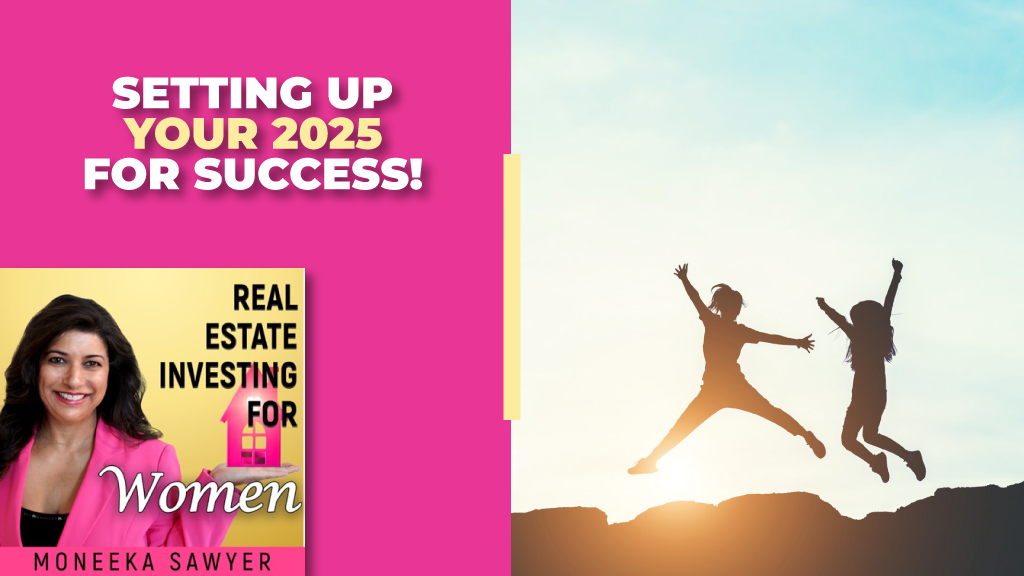



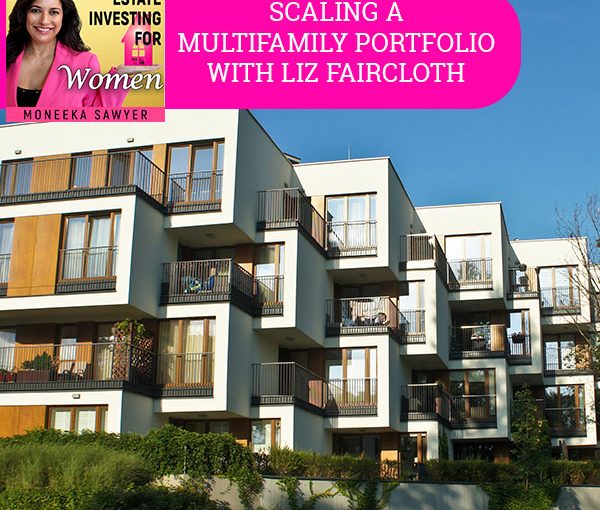
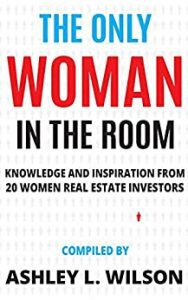
![[Customer Convo] Choosing Bliss, A New Giving Thanks Practice, And Real Estate With Chaitra Rai - Real Estate Women REW 34 | Choosing Bliss](https://blissfulinvestor.com/wp-content/uploads/2020/11/34REWsquare-600x510.jpg)
